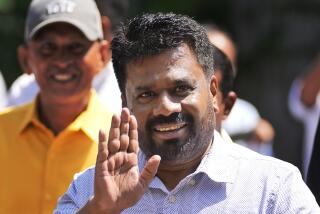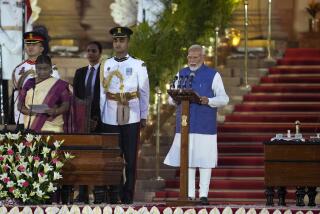India’s Congress Party wins strong support in national election
NEW DELHI — India’s elections took five weeks, cost hundreds of millions of dollars and involved 700 million eligible voters from the snow-capped Himalayas to the beaches of south India. But the wait was worth it for the ruling Congress Party alliance, which Saturday won a surprisingly strong showing at the polls.
In front of party headquarters in New Delhi, supporters set off fireworks and people danced in the street, some carrying posters of party leader Sonia Gandhi, others singing “Jai Ho,” from the “Slumdog Millionaire” soundtrack.
“I express my deep sense of gratitude to the people of the country for the massive mandate,” Prime Minister Manmohan Singh said.
Political analysts and exit pollsters were left a bit red-faced after predicting a tight race between Congress and the main opposition Bharatiya Janata Party, or BJP.
State television said the Congress alliance was expected to get about 261 seats -- just short of the 272 needed for a parliamentary majority -- compared with 160 for the BJP alliance and 58 for a “Third Front” group made up of Communist and other smaller parties.
Full results could take several days as Congress completes its coalition lineup.
Analysts said the results, coming on the heels of several years of economic growth, were a vote for continuity and a rejection of the BJP’s divisive Hindu nationalist platform.
“This is good for Indian democracy and good for secularism,” analyst Amulya Ganguli said.
The strong showing should also reduce pressure on the government to roll back economic reforms and weaken the Indian-U.S. nuclear agreement, a cornerstone of closer ties with Washington. That pressure had come from left-leaning parties, including India’s traditionally strong Communist Party, which lost ground.
Under the deal, negotiated by the Bush administration and passed by the U.S. Congress last year, Washington agreed to share civilian nuclear technology, ending a 30-year ban on sales of nuclear fuel and technology that was imposed after India tested and developed a nuclear bomb.
Congress and its key allies held their own in traditional strongholds such as Delhi, Rajasthan, Tamil Nadu and Andhra Pradesh, analysts said.
And they managed to gain ground in traditional BJP and Third Front strongholds, including Madhya Pradesh, Punjab, West Bengal and to some extent Orissa and Gujarat.
“It’s good to see that Congress won,” said Farooq Khan, 32, a betel-nut seller in New Delhi. “I didn’t open the shop today because I was glued to the television watching the election results.”
Singh, 76, who recently underwent heart bypass surgery, is expected to remain prime minister for at least a year or two before handing the reins over to heir-apparent Rahul Gandhi, 38, a member of India’s most famous political dynasty.
“It will be good for a young country to have young leadership,” said Ramesh Damani, a member of the Bombay Stock Exchange.
Gandhi, who emerged as a key strategist during the elections, is the son of Sonia Gandhi and slain former Prime Minister Rajiv Gandhi. His grandmother was former Prime Minister Indira Gandhi and his great-grandfather Jawaharlal Nehru, independent India’s first prime minister.
Despite the same name, the family is not related to the pacifist icon Mohandas Gandhi, a close ally of Nehru.
The opposition BJP, which has used emotive scare tactics to energize its Hindu base, failed to get much traction for this time.
Its efforts to paint the centrist Congress Party as weak on terrorism, and its personal attacks on Singh, a mild-mannered technocrat who oversaw India’s 1991 economic reforms, didn’t resonate with most voters.
“From south to north there is a wave in favor of Congress,” said Sanjay Kumar, a fellow at New Delhi’s Center for the Study of Developing Societies.
The business community appeared to breathe a sigh of relief, with Indian stocks expected to rally Monday. The government’s strengthened mandate under Singh was seen as a road map for more measured economic liberalization.
India has opened its markets, but generally chosen to do so while maintaining relatively strong government control. This balanced approach has been vindicated, some say, by the global downturn, which was fueled by speculative bubbles and inadequate oversight.
“India could become a real engine of growth in Asia,” Damani said. “This could become a real defining moment.”
--
Magnier is a Times staff writer and Ramaswamy works in The Times’ New Delhi Bureau.
More to Read
Sign up for Essential California
The most important California stories and recommendations in your inbox every morning.
You may occasionally receive promotional content from the Los Angeles Times.










